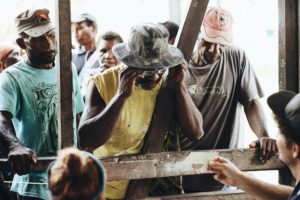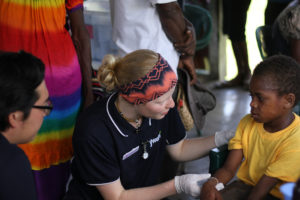For years, I was leery of mixing humanitarianism with Gospel ministry. The task of joining the two successfully has — historically — proved difficult. Anyone who has studied Christian missions knows that many organizations that started as Gospel-centered ended up scaling back their evangelism in an effort to focus on meeting people’s “practical” needs such as health care and education. But on a trip to Papua New Guinea in 2016, I witnessed a healthy marriage of “good works” and the “good news.” I saw that the two can enhance each other.

In March that year, I travelled to the northern side of the nation to document the work being done by YWAM Ships volunteers who were serving aboard the m/v PACIFIC LINK, a medical and training vessel. They were traveling to remote villages that lack access to hospitals. What I observed during my 10-week stay was as enlightening as it was encouraging.
While hundreds of people gathered to receive medical consultations, dental checkups and eye examinations, a Community Engagement Team preached the Gospel, allowed individuals to testify regarding how Jesus saved them and prayed for local villagers. They also downloaded the audio Bible and the “JESUS” film onto people’s phones (nowadays, even people in isolated, impoverished villages own smartphones). Our mobile medical clinics created an effective platform for discipleship.

Not only did YWAM volunteers receive the opportunity to bless people on a spiritual level because of the health clinics, they also did so through the clinics. To the Papua New Guineans I met, there was no distinction between the work of doctors and nurses and the intervention of God Himself. Many I met said that they had prayed — sometimes for years — that someone would come and relieve their ailments. When medical professionals came, villagers gave all the credit to Jesus for answering those prayers. The testimonies of those villagers even had an impact on some non-Christian volunteers we had traveling with our group.

It should have come as no surprise to me that God would seek to help people and bring honor to His own name through health care. Scripture affirms the value of such work. Jesus said “Those who are well have no need of a physician, but those who are sick” (Matthew 9:12, Mark 2:17, Luke 5:31). He could have said, “Those who are healthy have no need of supernatural healing…” Here He dignifies the practice of medicine. And just as God affirms the value of professional health care, many of the volunteers in Papua New Guinea fully acknowledged their need for God’s wisdom to remedy certain illnesses and injuries — as well as a touch of the Divine to make certain procedures a success.
Above all, my trip to Papua New Guinea taught me how God manifests His love to people through the helping hands of health workers. That’s the most important reason that anyone can do anything. To suggest that Christian missions shouldn’t combine with humanitarian activity is to suggest that God doesn’t care about people’s physical well-being. To suggest that God doesn’t care about people’s physical well-being is to misrepresent the character of God.

Yes: Health care can be a catalyst inspiring people to glorify God. I don’t know why some missions movements have not been able to successfully connect Christian worship and human welfare, but the two are by no means mutually exclusive. In fact, human welfare — both spiritual and physically — will be the ultimate outcome of God’s redemptive mission on the earth.
By Raymond Billy
Port YWAM Kona Communications Staff
Interested in knowing more? Contact us. We’d love to chat!
[ess_grid alias=”bottom-blog-grid-stories”]

